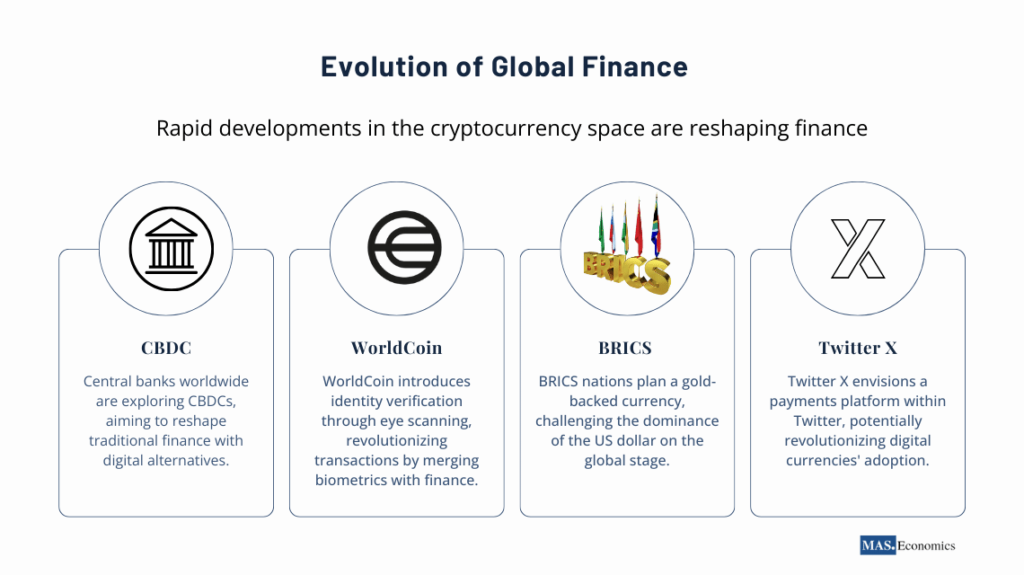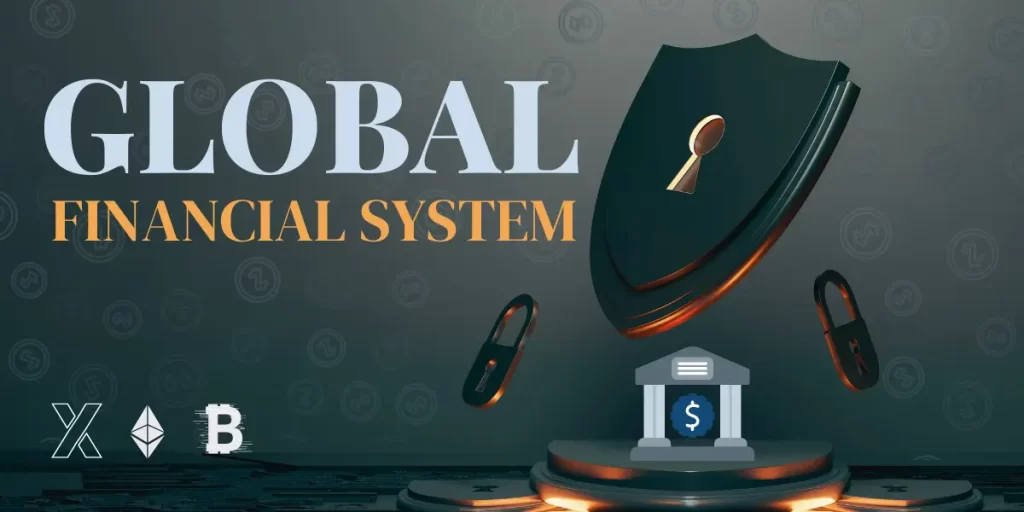The global financial system is undergoing a major transformation. The rise of digital payments, the increasing popularity of cryptocurrencies, and the growing concerns about financial privacy are all driving this transformation.
Digital payments are becoming increasingly popular as they offer convenience and security. In 2023, the global value of digital payments was estimated to be $9.46 trillion. This is expected to grow to $14.78 trillion by 2027.
It’s no exaggeration to say that we are in the midst of an “arms race” for control over this system. Various entities, including governments, central banks, private corporations, and even cryptocurrencies, are competing to shape the future of finance.
In this article, we will delve into the latest developments that are poised to have a profound impact on our money, wealth, freedom, and overall quality of life.
The US Government’s Motive
To comprehend the current financial landscape, it’s crucial to understand a simple yet unsettling fact: the US government, like many governments worldwide, desires a population that is financially dependent on it. This concept extends beyond money, touching upon various aspects of our lives. The government’s objective is to have its citizens reliant on welfare and government support, effectively maintaining control over their lives.
This dependency follows a cycle identified in Robert Lupton’s book, “Toxic Charity.” The cycle comprises five stages: appreciation, anticipation, expectation, entitlement, and finally, dependency. The government’s goal is to foster a culture of entitlement and dependency to ensure its subjects remain loyal and reliant on the state.
The Role of Central Bank Digital Currencies (CBDCs)
Central Bank Digital Currencies (CBDCs) are at the forefront of this financial transformation. CBDCs are digital representations of a country’s fiat currency, issued and controlled by the central bank. They aim to replace physical cash, making all financial transactions digital and traceable.
The US Federal Reserve (the Fed) has embarked on a journey to implement a CBDC system known as “FedNow.” This initiative seeks to establish the foundation for a future US dollar CBDC. The intention behind CBDCs is to give central banks complete control over the circulation and usage of money. This control extends to how, when, and even if we can spend our money, which is a stark departure from the financial autonomy many of us enjoy today.
The Issue of Inflation
Inflation is another facet of the financial system that often goes misunderstood. In simple terms, it erodes the value and purchasing power of our money over time. While governments have the power to print unlimited amounts of money, they continue to collect income taxes, property taxes, and other levies from their citizens. This practice, combined with inflation, leads to a gradual loss of wealth among the population.
Political Corruption and Scandals
The modern digital age has exposed significant political corruption, with independent journalism gaining prominence and challenging mainstream media. Recent events, such as the US Senate passing a bill to hire 87,000 new IRS agents while simultaneously blocking a bill to monitor and audit funds sent to Ukraine, highlight the systemic issues in politics.
Moreover, the relationship between cryptocurrency companies and politicians has raised questions about potential conflicts of interest. FTX, a prominent crypto exchange, faced allegations of being a “crypto laundromat” for the Ukrainian government, with its CEO, Sam Bankman-Freed, donating millions to politicians. Despite these allegations, charges of campaign finance violations against Sam Bankman-Freed were dropped, further undermining trust in the justice system.
The Upcoming US Election
The upcoming US presidential and congressional election is of paramount importance to the financial future of the nation. Several candidates have expressed their views on cryptocurrencies, with some being pro-crypto and others supporting CBDCs.
Pro-crypto candidates from both major political parties suggest a shifting attitude toward digital currencies in the political sphere. While the US operates within a two-party system, it is crucial to recognize that many view it as a one-party system, often referred to as the “business party.”

It is still too early to say what the impact of the upcoming US election will be on the future of cryptocurrencies and CBDCs. However, the candidates’ views on these issues will likely play a significant role in shaping the debate.
The election’s outcome could also affect the regulatory landscape for cryptocurrencies and CBDCs. If a candidate who supports cryptocurrencies is elected, the regulatory environment may become more favorable for these assets. However, if a candidate opposed to cryptocurrencies is selected, the regulatory environment may become more restrictive.
Cryptocurrency Developments
Various entities are vying for control over the global financial system. Cryptocurrencies, in particular, have gained prominence as a potential alternative to traditional fiat currencies. The rapid developments in the cryptocurrency space are reshaping the financial landscape.
BlackRock, the world’s largest asset manager, has recommended a significant portfolio allocation to Bitcoin, suggesting that the cryptocurrency’s value could surpass the combined total of equities, real estate, and bonds.
However, cryptocurrency adoption faces regulatory challenges, with governments worldwide contemplating their approach to digital assets. The US government has shown conflicting stances, with some politicians advocating for crypto-friendly policies while others support stricter regulations.

The Power of Bitcoin
Bitcoin, often referred to as “financial gunpowder,” represents a unique asset class that transcends traditional currencies. Its qualities, including decentralization, security, and scarcity, make it a compelling alternative to government-controlled fiat currencies. While the adoption of Bitcoin is not a matter of convincing individuals, it is an economic reality that offers a way for people to maintain control and ownership of their wealth.
The Emergence of WorldCoin
In recent developments, Sam Altman, the founder of OpenAI, introduced WorldCoin, a cryptocurrency project that ties identity verification to digital currency. Users must visit designated “orbs” worldwide to scan their eyes and verify their identity to receive a World ID and access a form of universal basic income. This system blurs the line between financial transactions and biometric information, aiming to create dependence on the platform.
BRICS Gold-Backed Currency
The BRICS group of nations—Brazil, Russia, India, China, and South Africa—has announced plans to introduce a gold-backed currency. While this move challenges the dominance of the US dollar, it raises questions about which country will be entrusted with safeguarding the gold reserves that back this new currency.
Twitter’s Transition to X
Elon Musk’s announcement of Twitter’s transformation into a platform called X has ignited curiosity about its role in the global financial system. Musk envisions Twitter X as a payments platform, allowing users to send money, extract funds to bank accounts, and potentially offering high-yield money market accounts. The choice of cryptocurrency for this platform remains unknown, but it could have a significant impact on the adoption of digital currencies.
Conclusion
The global financial system is undergoing a rapid and transformative evolution. From CBDCs to cryptocurrency developments and geopolitical shifts, various forces are shaping the future of finance. Individuals must remain vigilant, informed, and engaged in discussions about these developments, as they hold the potential to influence our financial well-being, freedom, and autonomy.
In these uncertain times, diversification across various asset classes, including cryptocurrencies and alternative investments like fine art, can help individuals navigate the changing financial landscape. Ultimately, Bitcoin stands as a beacon of financial autonomy, offering a path for individuals to break free from the traditional financial system’s control and maintain ownership over their wealth.




